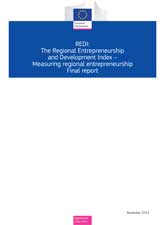
The main outcome of the project is a new index (REDI - Regional Entrepreneurship and Development Index) that describes the entrepreneurial process. The index takes into account both individual attitudes and characteristics and the regional context and, accordingly, not only whether people are willing to start a business but whether the conditions to do so are in place in the region concerned. The index is composed of three sub-indices covering entrepreneurial attitudes, abilities and aspirations. Each of the sub-indexes has an individual component (relating to the individual decision making behaviour) and an institutional component (relating to the context). Entrepreneurial attitudes indicate the attitudes of the population in a region as they relate to entrepreneurship, including elements such as perception of opportunities and risks, cultural support and networking. These are measured by indicators of market agglomeration, social capital and the extent of corruption. Entrepreneurial abilities measure characteristics of entrepreneurs and business start-ups with high growth potential, such as the take-up of technology, the level of human capital and the degree of market competition.
The index contains both individual-level and institutional or environmental indicators, which reflect the regional context. For example, a factor such as the perception of risk is the outcome of combining an institutional factor (the actual business risk faced by a start-ups as measured by the business closure rate) and an individual one (the personal acceptance of risk by entrepreneurs, measured by the proportion of the population aged 18-64 stating that the fear of failure would not prevent them starting a business).
The indicators used include the educational level, the degree of sophistication of businesses and the freedom for businesses to operate. Entrepreneurial aspirations refer to the distinctive, strategy-related nature of entrepreneurial activity such as product and process innovation and access to financing. These are measured by indicators of innovation, R&D and the development of the financial market. The indicators can relate to either regions (NUTS1 or NUTS2) or countries.
The variations in entrepreneurship across the 125 regions (NUTS1 or 2) are substantial, with over four-fold difference between the region with the highest ranking (Hovedstaden in Denmark) and that with the lowest (Macroregiunea doi in Romania). There are four Swedish, two Danish, two British, one French and one Irish region in the top 10. Regions performing well are located also in Belgium, Netherlands, Germany and Austria. Interesting sub-national variations can be observed in Germany, France and the UK. The analysis of the individual aspects for entrepreneurship gives a slightly different picture than the combined index. The top 10 regions of the 'individual' index still include 5 of those in the top 10 of the combined index (e.g. London, Hovedstaden and Ile de France), but there are also the two Slovenian regions and the two Irish ones. The bottom 10 regions, unlike in the case of the combined index, include three German and four Polish ones.
